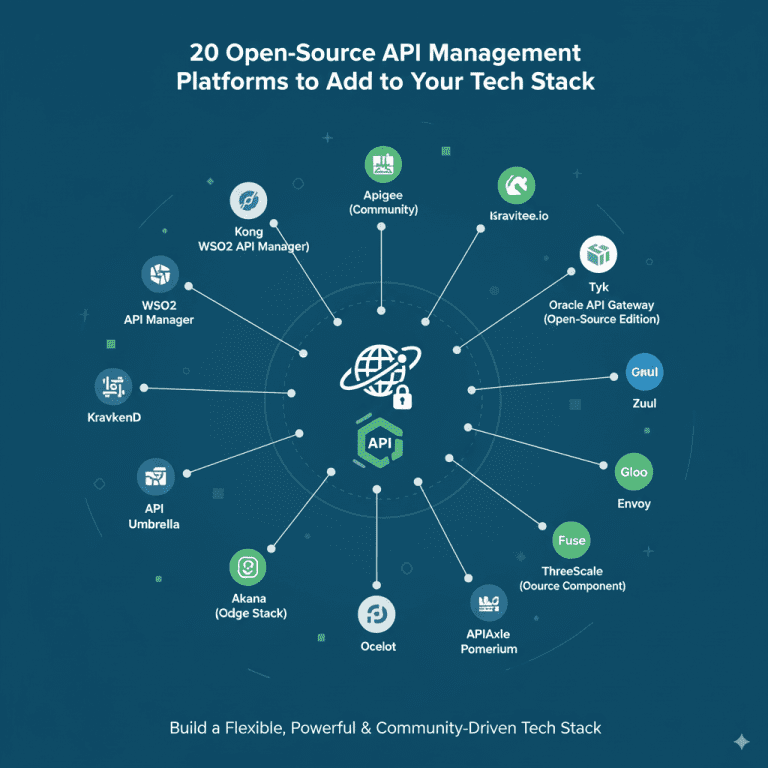Introduction
In today’s fast-evolving digital landscape, APIs (Application Programming Interfaces) play a pivotal role in enabling seamless communication between software systems, driving innovation, and accelerating time-to-market. Efficiently managing APIs across development, deployment, security, and monitoring stages is critical for business agility. This is where API management platforms come into play—empowering organizations to publish, secure, monitor, and scale APIs effectively.
Open-source API management platforms provide the flexibility, cost-efficiency, and community-driven innovations that many organizations seek. Whether you are a startup building your technology stack or an enterprise looking to optimize API lifecycle management, integrating the right open-source solutions is key.
This blog explores 20 powerful open-source API management platforms to consider adding to your tech stack, describing their key features and use cases. For digital transformation insights and related technology trends, explore TechOTD’s AI and tech blog and their extensive AI service offerings.
Top 20 Open-Source API Management Platforms
1. Kong
A scalable, cloud-native API gateway with features like traffic control, authentication, and analytics. Kong supports plugins for flexibility and is widely adopted for microservices architectures.
2. Tyk
Full lifecycle API management with a powerful gateway, analytics, developer portal, and dashboard. Tyk supports hybrid deployments and advanced security protocols.
3. Apiman
Red Hat’s open-source API manager offering governance, rate limiting, and security. It integrates well with Java-based environments and supports customizable policies.
4. WSO2 API Manager
An open-source enterprise-grade API management solution providing API publishing, lifecycle management, security, and analytics. Supports on-premises and cloud deployment.
5. Gravitee.io
Lightweight and modular, Gravitee.io offers an API gateway, developer portal, and management tools with a user-friendly interface.
6. KrakenD
An ultra-high-performance API gateway focused on aggregating multiple backend services into a single API endpoint. It simplifies API transformation and scaling.
7. Express Gateway
An open-source API gateway built on Node.js, ideal for teams looking for lightweight, customizable API management with policy-driven security.
8. Zuul
Netflix’s highly scalable gateway solution designed for routing and filtering requests in microservices environments. Features dynamic routing and resiliency.
9. Ambassador
A Kubernetes-native API gateway built on Envoy proxy, offering fast API routing, authentication, and observability for cloud-native apps.
10. Ocelot
A .NET API Gateway designed for simple, rapid deployment with support for routing, rate limiting, and authentication.
11. API Umbrella
Open-source API management platform providing unified authentication, rate limiting, caching, and analytics.
12. Wrench
Designed for simplified API running and monitoring with built-in support for health checks, rate limiting, and logging.
13. Janus
A high-performance API gateway written in Golang that supports plugin-based extensions and dynamic routing.
14. Fusio
API management platform focusing on API automation, analytics, and auto-documentation, suitable for PHP environments.
15. Kong Mesh
Built on top of Kong Gateway, offers service mesh capabilities for microservices environments emphasizing security and observability.
16. KrakenD Enterprise Edition (CE available)
Enables complex API composition with robust caching, rate limiting, and middleware support.
17. Apisix
A dynamic, real-time, cloud-native API gateway based on Nginx and OpenResty, providing flexible routing and plugin systems.
18. Tyk Hybrid
Open-source core with options for hosted cloud dashboard services; focuses on high-scale API operations and developer experience.
19. WSO2 Microgateway
Modular API gateway optimized for microservices, integrating with Kubernetes and service mesh environments.
20. Spring Cloud Gateway
Designed for Spring Boot applications, offering a simple yet effective way to route API requests with integrated security mechanisms.
Benefits of Using Open-Source API Management Platforms
-
Cost Efficiency: Eliminate expensive licensing fees with open-source solutions.
-
Flexibility: Customize and extend platforms to meet unique business requirements.
-
Community Support: Benefit from active communities and rapid innovation cycles.
-
Transparency and Control: Full access to code for auditing and compliance.
-
Seamless Integration: Easily integrate with existing frameworks and cloud environments.
Choosing the Right API Management Platform
Factors to consider:
-
Deployment model compatibility (on-premises, cloud, hybrid).
-
Scalability and performance needs.
-
Security and compliance features.
-
Developer experience and ecosystem.
-
Integration with analytics and monitoring tools.
For expert guidance and custom API solutions development leveraging AI and cloud, consult with TechOTD’s services.
Conclusion
API management platforms are indispensable tools in the digital ecosystem, enabling businesses to securely expose and monetize their services. The open-source options listed above provide robust, scalable, and flexible capabilities suitable for a vast range of use cases from startups to enterprises. Selecting the right platform aligned with your technology landscape and strategic goals will empower accelerated innovation and superior API performance.
Explore more on APIs and digital transformation trends with TechOTD here:
TechOTD Blog.
FAQs
Q1: What is an API management platform?
It’s a tool that helps design, secure, publish, monitor, and analyze APIs across their lifecycle.
Q2: Are open-source API platforms reliable for enterprises?
Many leading companies use open-source solutions for their flexibility, cost-effectiveness, and community support.
Q3: What features should I prioritize when selecting an API management platform?
Security, scalability, ease of integration, and developer tools are key priorities.
Q4: Can API management platforms improve developer productivity?
Yes, they offer tools like developer portals, documentation, and analytics that simplify API consumption and support.
Q5: How does AI enhance API management?
AI can optimize traffic routing, detect anomalies, and automate policy enforcement for smarter API governance.











